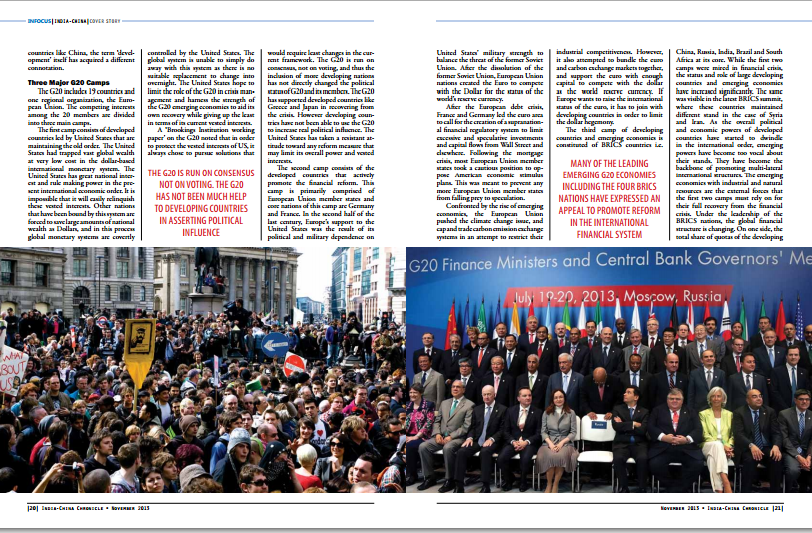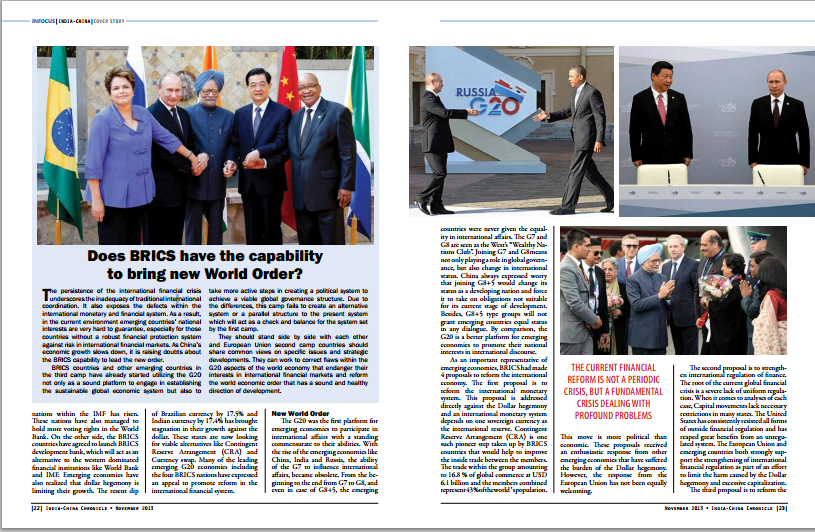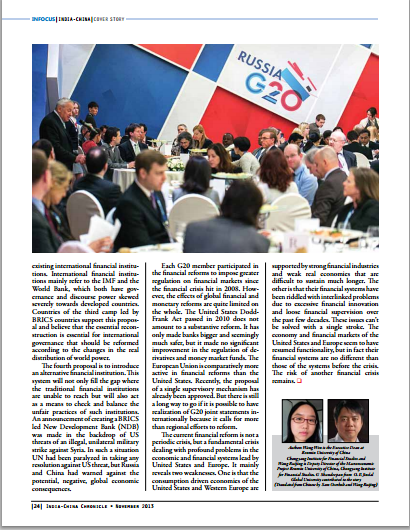Global South Sculpting G20 to New World Order?
The G20 is product of the transitional era. The world has accepted emerging economies as significant players on the global stage. Leaders of the previous World Order still want to retain the hegemonic status as global rule makers. Due to a shift in the economic status, proponents of the New Order hope that they can become core partners in constructing new rules, and have more of a say in international affairs after the coming structural shift. G20 members are destined to have vastly different interests and standings on many issues. These different opinions will make it extremely difficult to reach a common consensus.

Wang Wen & Wang Ruijing
The G20 Leaders’summit 2013 of Finance Ministers’and Central Bank Governors’was held in St. Petersburg on September 5-6, 2013. The core discussion of the summit was based on topics ranging the recovery of global economy, vulnerabilities of financial sector, enhancing multilateral trade and international financial reform. The other subjects included financing for investment, corruption,structural unemployment and energy sustainability.The meet provided enormous opportunity for BRICS countries and recognized the potential requisite of BRICS in the recovery of global economy. Till 2012, these countries have contributed $75 billion to IMF and have further agreed to contribute $100 billion funds by creating pool of funds to stabilize the economy.
The G20 is a new organization, which was created to take the impact of the global financial crises that had twice shocked the world. First was the 1997 Asian Financial Crisis, where “The Wealthy Nations Club” of the G7 first discovered that it was impossible to manage the financial crisis alone. The G20 emerged as a new coordinated response of these 20 parties. Second was the 2007 United States sub-prime mortgage crisis. In this crisis the G7 itself was a “ground zero”. For faster recovery, the developed countries were forced to rely on the emerging countries and other world economies. The G20 Leaders’Summit gradually replaced the G8’s function as a primary means to influence international financial affairs and policy.
Globalization and consequent Global financial crises had greatly influenced international political economy. Till 2007, Globalization was represented as a process of “Americanization”, pursuing the global implementation of Western style governance models oriented by the interests of the United States. However, with the emergence of countries like China, the term ‘development’ itself has acquired a different connotation.

Three Major G20 Camps
The G20 includes 19 countries and one regional organization, the European Union. The competing interests among the 20 members are divided into three main camps.
The first camp consists of developed countries led by United States that are maintaining the old order. The United States had trapped vast global wealth at very low cost in the dollar-based international monetary system. The United States has great national interest and rule making power in the present international economic order. It is impossible that it will easily relinquish these vested interests. Other nations that have been bound by this system are forced to save large amounts of national wealth as Dollars, and in this process global monetary systems are covertly controlled by the United States. The global system is unable to simply do away with this system as there is no suitable replacement to change into overnight. The United States hope to limit the role of the G20 in crisis management and harness the strength of the G20 emerging economies to aid its own recovery while giving up the least in terms of its current vested interests.
A ‘Brookings Institution working paper’on the G20 noted that in order to protect the vested interests of US, it always chose to pursue solutions that would require least changes in the current framework. The G20 is run on consensus, not on voting, and thus the inclusion of more developing nations has not directly changed the political status of G20 and its members. The G20 has supported developed countries like Greece and Japan in recovering from the crisis. However developing countries have not been able to use the G20 to increase real political influence. The United States has taken a resistant attitude toward any reform measure that may limit its overall power and vested interests.
The second camp consists of the developed countries that actively promote the financial reform. This camp is primarily comprised of European Union member states and core nations of this camp are Germany and France. In the second half of the last century, Europe’s support to the United States was the result of its political and military dependence on United States’ military strength to balance the threat of the former Soviet Union. After the dissolution of the former Soviet Union, European Union nations created the Euro to compete with the Dollar for the status of the world’s reserve currency.
After the European debt crisis, France and Germany led the euro area to call for the creation of a supranational financial regulatory system to limit excessive and speculative investments and capital flows from Wall Street and elsewhere. Following the mortgage crisis, most European Union member states took a cautious position to oppose American economic stimulus plans. This was meant to prevent any more European Union member states from falling prey to speculation.
Confronted by the rise of emerging economies, the European Union pushed the climate change issue, and cap and trade carbon emission exchange systems in an attempt to restrict their industrial competitiveness. However, it also attempted to bundle the euro and carbon exchange markets together, and support the euro with enough capital to compete with the dollar as the world reserve currency. If Europe wants to raise the international status of the euro, it has to join with developing countries in order to limit the dollar hegemony.
The third camp of developing countries and emerging economies is constituted of BRICS countries i.e. China, Russia, India, Brazil and South Africa at its core. While the first two camps were mired in financial crisis, the status and role of large developing countries and emerging economies have increased significantly. The same was visible in the latest BRICS summit, where these countries maintained different stand in the case of Syria and Iran. As the overall political and economic powers of developed countries have started to dwindle in the international order, emerging powers have become too vocal about their stands. They have become the backbone of promoting multi-lateral international structures. The emerging economies with industrial and natural resources are the external forces that the first two camps must rely on for their full recovery from the financial crisis. Under the leadership of the BRICS nations, the global financial structure is changing. On one side, the total share of quotas of the developing nations within the IMF has risen. These nations have also managed to hold more voting rights in the World Bank. On the other side, the BRICS countries have agreed to launch BRICS development bank, which will act as an alternative to the western dominated financial institutions like World Bank and IMF. Emerging economies have also realized that dollar hegemony is limiting their growth. The resent dip of Brazilian currency by 17.5% and Indian currency by 17.4% has brought stagnation in their growth against the dollar. These states are now looking for viable alternatives like Contingent Reserve Arrangement (CRA) and Currency swap. Many of the leading emerging G20 economies including the four BRICS nations have expressed an appeal to promote reform in the international financial system.

New World Order
The G20 was the first platform for emerging economies to participate in international affairs with a standing commensurate to their abilities. With the rise of the emerging economies like China, India and Russia, the ability of the G7 to influence international affairs, became obsolete. From the beginning to the end from G7 to G8, and even in case of G8+5, the emerging countries were never given the equality in international affairs. The G7 and G8 are seen as the West’s “Wealthy Nations Club”. Joining G7 and G8means not only playing a role in global governance, but also change in international status. China always expressed worry that joining G8+5 would change its status as a developing nation and force it to take on obligations not suitable for its current stage of development. Besides, G8+5 type groups will not grant emerging countries equal status in any dialogue. By comparison, the G20 is a better platform for emerging economies to promote their national interests in international discourse.
As an important representative of emerging economies, BRICS had made 4 proposals to reform the international economy. The first proposal is to reform the international monetary system. This proposal is addressed directly against the Dollar hegemony and an international monetary system depends on one sovereign currency as the international reserve. Contingent Reserve Arrangement (CRA) is one such pioneer step taken up by BRICS countries that would help to improve the inside trade between the members. The trade within the group amounting to 16.8 % of global commerce at USD 6.1 billion and the members combined represent 43 % of the world´s population. This move is more political than economic. These proposals received an enthusiastic response from other emerging economies that have suffered the burden of the Dollar hegemony. However, the response from the European Union has not been equally welcoming.
The second proposal is to strengthen international regulation of finance. The root of the current global financial crisis is a severe lack of uniform regulation. When it comes to analyses of each case, Capital movements lack necessary restrictions in many states. The United States has consistently resisted all forms of outside financial regulation and has reaped great benefits from an unregulated system. The European Union and emerging countries both strongly support the strengthening of international financial regulation as part of an effort to limit the harm caused by the Dollar hegemony and excessive capitalization.
The third proposal is to reform the existing international financial institutions. International financial institutions mainly refer to the IMF and the World Bank, which both have governance and discourse power skewed severely towards developed countries. Countries of the third camp led by BRICS countries support this proposal and believe that the essential reconstruction is essential for international governance that should be reformed according to the changes in the real distribution of world power.
The fourth proposal is to introduce an alternative financial institution. This system will not only fill the gap where the traditional financial institutions are unable to reach but will also act as a means to check and balance the unfair practices of such institutions. An announcement of creating a BRICS led New Development Bank (NDB) was made in the backdrop of US threats of an illegal, unilateral military strike against Syria. In such a situation UN had been paralyzed in taking any resolution against US threat, but Russia and China had warned against the potential, negative, global economic consequences.
Each G20 member participated in the financial reforms to impose greater regulation on financial markets since the financial crisis hit in 2008. However, the effects of global financial and monetary reforms are quite limited on the whole. The United States DoddFrank Act passed in 2010 does not amount to a substantive reform. It has only made banks bigger and seemingly much safer, but it made no significant improvement in the regulation of derivatives and money market funds. The European Union is comparatively more active in financial reforms than the United States. Recently, the proposal of a single supervisory mechanism has already been approved. But there is still a long way to go if it is possible to have realization of G20 joint statements internationally because it calls for more than regional efforts to reform.
The current financial reform is not a periodic crisis, but a fundamental crisis dealing with profound problems in the economic and financial systems lead by United States and Europe. It mainly reveals two weaknesses. One is that the consumption driven economies of the United States and Western Europe are supported by strong financial industries and weak real economies that are difficult to sustain much longer. The other is that their financial systems have been riddled with interlinked problems due to excessive financial innovation and loose financial supervision over the past few decades. These issues can’t be solved with a single stroke. The economy and financial markets of the United States and Europe seem to have resumed functionality, but in fact their financial systems are no different than those of the systems before the crisis. The risk of another financial crisis remains.

Does BRICS have the capability to bring new World Order?
The persistence of the international financial crisis underscores the inadequacy of traditional international coordination. It also exposes the defects within the international monetary and financial system. As a result, in the current environment emerging countries’ national interests are very hard to guarantee, especially for those countries without a robust financial protection system against risk in international financial markets. As China’s economic growth slows down, it is raising doubts about the BRICS capability to lead the new order.
BRICS countries and other emerging countries in the third camp have already started utilizing the G20 not only as a sound platform to engage in establishing the sustainable global economic system but also to take more active steps in creating a political system to achieve a viable global governance structure. Due to the differences, this camp fails to create an alternative system or a parallel structure to the present system which will act as a check and balance for the system set by the first camp.
They should stand side by side with each other and European Union second camp countries should share common views on specific issues and strategic developments. They can work to correct flaws within the G20 aspects of the world economy that endanger their interests in international financial markets and reform the world economic order that has a sound and healthy direction of development.